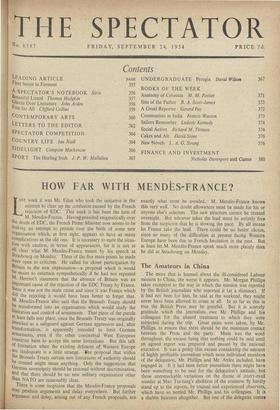HOW FAR WITH MENDES-FRANCE?
• T week it was Mr. Eden who took the initiative in the attempt to clear up the confusion caused by the French rejection of EDC. This week it has been the turn of M. Mendes-France. Having presided enigmatically over the death of EDC, the French Prime Minister now seems to be making an attempt to preside over the birth of some new organisation which, at first sight, appears to have as many Complications as the old one. It is necessary to state the situa- tion with caution, in terms of appearances, for it is not at all clear what M.: •Mendes-France meant liy his speech at Strasbourg on Monday. Three of the five main points he made were open to criticism. He called for closer participation by Britain in the new organisation—a proposal which it would be easier to entertain sympathetically if he had not repeated M. Herriot's statement that the absence of Britain was an unportant cause of the rejection of the EDC Treaty by France. Since it was not the main cause and since it was France which did the rejecting it would have been better to forget that. M. Mendes-France also said that the Brussels Treaty should be transformed into an organisation which would study the limitation and control of armaments. That piece of the puzzle at_least falls into place, since the Brussels Treaty was originally intended as a safeguard against German aggression and, after transformation, is apparently intended to limit German armaments, even if the other continental West European Countries have to accept the same limitations. But this talk of limitation when the existing defences of Western Europe are inadequate is a little strange. 4he proposal that within the Brussels Treaty certain new limitations of authority should be created might mean anything. Only the suggestions that German sovereignty should be restored without discrimination, and that there should be no new military organisation other than NATO are reasonably clear. There is some suspicion that the Mendes-France proposals may produce arguments and delay everywhere. But further argument and delay, arising out of any French proposals, are exactly what must be avoided. M. Mendes-France knows this very well. No doubt allowances must be made for his or anyone else's schemes. The new structure cannot be created overnight. But whoever takes the lead must be entirely free from the suspicion that he is slowing the pace. By all means let France take the lead. There could be no better choice, since so many of the difficulties at present facing Western Europe have been due to French hesitation in the past. But at least let M. Mendes-France speak much more plainly than he did at Strasbourg on Monday.


































 Previous page
Previous page